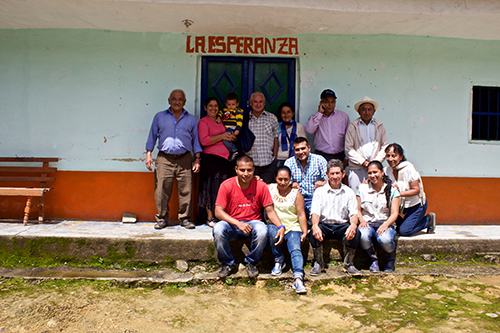
One such success story can be found in a project carried out in 2016 among 60 coffee-growing families from the Asogrupos producer association in La Sierra – Cauca, Colombia. The objective was to help these families reduce their carbon footprint by adopting a farm model that is less damaging to the environment.
During the project, a Solidaridad field expert and an extensionist hired by Asogrupos worked together with farmers on three specific aspects:
-
decreasing firewood consumption
-
increasing forested area
-
producing organic fertilizers for crops
Stoves, firewood and shade for crops
Before joining this pilot, the participating families used traditional stoves that required large amounts of firewood from native forests. The stove structures were also unsuitable. They often filled the rooms with smoke, directly affecting women who were in charge of cooking.
“That kitchen was too hot, smoky. It damaged my vision and gave me headaches,” explained Rosa Inés Córdoba, one of the participating coffee growers.
To help alleviate some of the women’s hardships, part of the initiative entailed the installing new stoves that save energy, produce less smoke and have proper ventilation. Rosa Inés now has an easier and much healthier way of performing her daily tasks.
“I prepare meals in less time and the smoke exits from above. We use less firewood because we cut it into little pieces and it heats up quicker,” Rosa Inés said.
Halting decades of logging
In addition to reducing carbon emissions by making stoves more efficient, the project addressed the challenge of reforesting and renewing natural resources. The project area, in fact, has been suffering from at least two decades of excessive logging to expand illegal crop land.
We need to stop logging. Twenty years ago, the town’s higher land was covered by untouched forests. – Asogrupos Manager Francisco Arias.
Arias was a key figure in helping motivate families to embrace new tools and methods offered by Solidaridad’s programme.
A number of improvements
To increase forested area, each family planted 200 trees under the guidance of Julián Titiango, a local forestry engineer. The trees included species such as leucaena or ash trees to use exclusively as firewood, and another 10 native trees, like oaks, pink cedars and “cachimbo” to provide coffee plantations with shade, regulate water levels and protect the soil.
The farmers planted 12,600 trees in La Sierra, which will also contribute significantly to carbon sequestration.
Reusing household waste
The last component of the pilot consisted of training coffee growers to produce their own fertilizers based on organic waste coming from kitchens, ashes and manure. Doing so helps reduce pollution originating from inefficient waste management and carbon emissions linked to chemical fertilizers.
In addition to being better for the environment, producing own fertilizer is economically beneficial to the farmers. It reduces dependency on external inputs, which increases savings and productivity in farms.
Interesting facts:
-
Solidaridad is seeking to continue this project in other areas to reduce the carbon footprint in Colombia’s coffee value chain even further.
-
Farmer associations are key to developing these kind of initiatives because they allow Solidaridad to reach more smallholder families through a single network.
- Asogrupos has been supporting small farmers in La Sierra – Cauca for more than 20 years.
Learn more about Solidaridad programmes in South America
